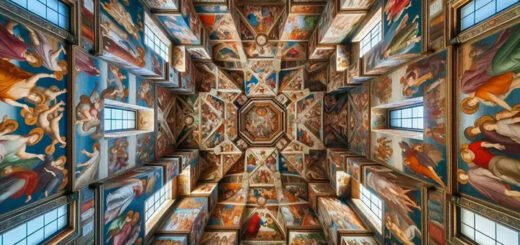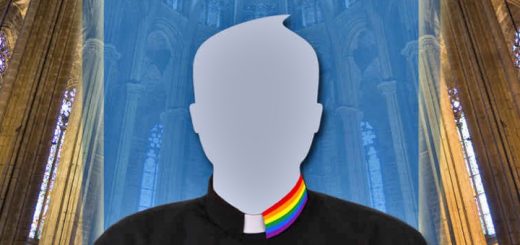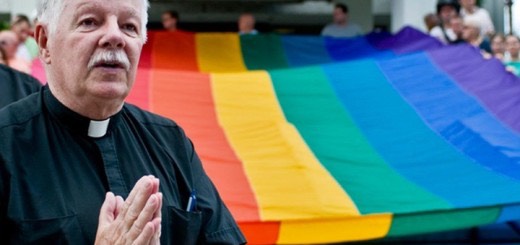From Catholic priest to Episcopal priest, happily gay
Article by Jeff Diamant published on the agency's blog Religion News Service (United States) on November 30, 2005, freely translated by Diana
He left the priesthood in 1998 because he was tired of hiding his identity as a gay man in a Church that condemns homosexuality. The Rev. Mariano Gargiulo, now an Episcopal priest of the Diocese of Newark, thinks than the Vatican edict of November 29, 2005, which bans gay men from entering the seminary, will force many priests to leave the Church.
Gargiulo, who continues to be friends with several gay priests from his time in the Archdiocese of Newark, predicts that this veto will increase tensions within the Church, even if it does not apply to current priests: “It will drive away a lot of them”Gargiulo said of the document already leaked to newspapers and widely disseminated even before the official release on November 29: “The Vatican says homosexuality is intrinsically disordered, and how many times do you hear that before you have time to respond: Maybe I'll go somewhere else.”.
Older priests are less likely to leave, because they need the Church to pay their pension: “They will hide. They'll lock themselves in the closet, because it's a comfortable lifestyle.".
From his office at St. James Episcopal Parish in Ridgefield, Gargiulo believes his experience can become a model for many gay priests, especially non-celibate ones. Gargiulo's observations are based on articles (proved to be accurate after the November 29 document) in the Italian magazine Adista, who last week announced that the Vatican would ban men from seminaries “with deep-rooted homosexual tendencies” or gays who support the so-called 'gay culture'”. Those who have instead overcome “transient homosexual tendencies” for at least three years, they may be admitted to the seminary.
While already ordained priests will not be affected by such a veto, the policy will add fuel to a divisive debate over homosexuality, raising questions about whether the Church, with its declining number of priests, can afford to keep gays out of the seminary.
No one knows how many gay Catholic priests there are, but estimates vary from one in ten to more than half. A report published by the United States Conference of Catholic Bishops in 2004 reports that “a homoerotic culture” and “a gay subculture” they have taken root in U.S. Catholic seminaries since the 1960s.
Gargiulo said he was not gay at the time of the archdiocesan seminary at Immaculate Conception in Mahwah, New York, which he attended in the late 1970s. He felt he was gay, but hadn't fully realized it yet, nor had he ever had anything to do with gay people until 1982, the year he was ordained.
Gargiulo, fifty-one, is not active in gay political circles, but is open on the topic of sexuality. His estimate of the percentage of gay priests is on the high end, more than half. He realized early on, after his coming out, that gay priests in the Church were a common reality.
In the mid-1980s he said he broke his priestly vow of chastity six times, mostly with other Catholic priests. However, he wanted to remain a Catholic priest: "I was coming to terms with the fact that I am human and I would make mistakes, but then I began to understand that it wasn't right."
When he imparted the sacrament of marriage he felt like a hypocrite, because he had broken his vow of chastity: "It's not right", he said to himself, "I'm asking these people in front of me to respect their marriage vows... and I respect mine votes?".
In the late 1980s he left the archdiocese to work with AIDS patients. Because of his sexuality, he began to look for ways to leave the Church. He researched Baptists, Methodists, United Church of Christ, Orthodox, Presbyterians, and Episcopalians: “I always came back to the Episcopal Church. The United Church of Christ at the time was the only one that ordained gay/lesbian priests, but for me it wasn't sacramental enough.”
The Episcopal Church accepts gay priests and does not require a vow of celibacy. The Episcopal bishop of Newark at the time, John Shelby Spong, urged Gargiulo to meet with his Catholic archbishop before leaving the Catholic Church.
Gargiulo met Theodore McCarrick in 1998. He said he was gay and had been in a relationship with another man for five years. The archbishop wanted to take him back as a priest again, but with the vow of celibacy, and Gargiulo refused: “I told him, 'I have to tell you that my partner is out here, and if you wanted to meet him, I would love to, but if he doesn't want to, I totally understand.'”.
“The bishop replied that he wanted to meet him and went out, shook his hand and it was very nice. Then he said to him: 'Mariano has worked hard for us for many years, take care of him. God bless you. I must say he was a true gentleman.".
Gargiulo was greatly shaken by a letter he received three years later from McCarrick's successor, John J. Myers, in response to his announcement that he had decided to become an Episcopal priest. Myers' letter informed him that he was declared a schismatic, and consequently excommunicated (Myers' spokesman, James Goodness, added that the excommunication was in no way related to his sexual orientation).
Gargiulo showed the letter to Jack Croneberger, who had recently become an Episcopal bishop in Newark. A month later, when Gargiulo was welcomed into the Episcopal Church, Croneberger stunned Gargiulo by doing something a Catholic bishop would never do: “He invited my partner, made us sit next to him, and grabbed our hands and said, 'I want to thank you because you are an example in this Church of what a gay couple can be, and how a gay couple who loves each other can do part of the ecclesial community'”.
Original text: Former Catholic Cleric Predicts Gay Exodus from Priesthood






